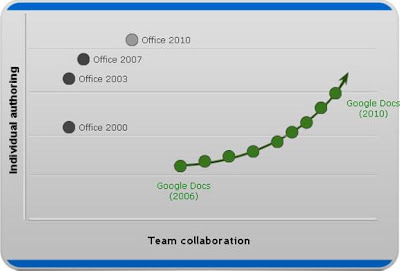- The Google Drawing Editor supports Copy and Paste between applications.
- Google Docs have Rulers with Tab stops plus Spell check.
- Google Spreadsheets have a Formula editing Bar and simultaneous editing for fifty users.
Then there was this wonderful (but totally meaningless) slide with no external references. I'm intrigued to know what measurements Google used to set the scale on the X and Y axis but I don't think there's an answer to that question.

However once you pass over the fluff and bubble there were some interesting snippets in the articles.
- Google is disabling Google Gears for Docs. It intends to rewrite that component so it can handle HTML5 and modern Web browsers. Now I don't have a problem with a software company rewriting their code to include new technologies, but it does show that the Google architecture is no more future-proof than Microsoft Exchange. In other words, Google has some good ideas but there was nothing extraordinary about their initial implementation of those ideas. On the other hand, Notes/Domino continues to provide backwards compatibility even while it evolves to include new technologies eg X-Pages. Score one for IBM.
- Google is implementing this change in three weeks time. Your company may have made a significant investment in learning and applying Google Gears to your applications but after May 3rd you're back to Square One. That's another big gotcha in the cloud computing scenario - consumers are completely disenfranchised in their preference for software versions.
Leaving aside the multi-user access, I'm thinking that all of the 'new' features Google are crowing about have been standards in Microsoft Office and Open Office for years. I'm glad to see Google providing competition in the Office arena but IMHO they need to lift their game.
I'll stick with Symphony.
.




2 comments:
I had a similar reaction when I saw that Google chart on another blog. It seems like Google doesn't get the personal nature of productivity at all.
MS have had those office features for years but not as web components. That's the real innovation.
Google is still operating under the "your friendly personal (and free) company from down the road" banner and while I applaud the move to HTML 5, it's a drastic change to make from a (paying) business point of view.
I'll be interested to see how they handle compatibility issues if and when they arise.
Right now, I'm not aware of too many companies heavily investing in Gears, so it might still be a safe change to make.
Post a Comment